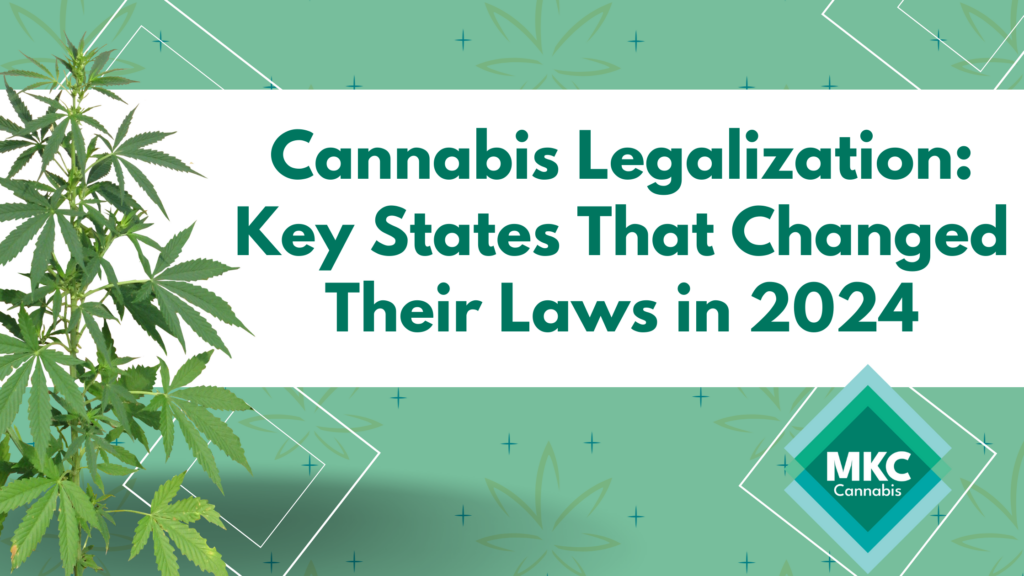With the wave of cannabis legalization continuing to grow across the United States, 2024 has seen significant advancements in several states. These changes reflect an ongoing shift in public opinion, with more states moving toward decriminalization, medical access, and even recreational legalization. In this blog, we’ll take a closer look at the key states that changed their cannabis laws this year, what those changes entail, and how they impact both businesses and consumers.
1. New York: Full Embrace of Recreational Cannabis
After legalizing recreational cannabis in 2021, New York faced challenges in establishing a fully functioning cannabis market. However, 2024 brought significant developments in regulations that improved access for both consumers and businesses. This year, the state expanded licensing opportunities for small businesses, increased resources for social equity applicants, and allowed delivery services to operate across the state. Additionally, New York implemented policies to make cannabis products more affordable through reduced excise taxes.
Impact: These changes are expected to boost local economies and support small business owners, especially those from communities disproportionately affected by prior cannabis laws. For consumers, this means a wider selection of legal cannabis products and delivery options, making New York a notable example of progressive cannabis reform in 2024.
2. Texas: New Medical Cannabis Expansions
Known for its traditionally conservative stance on cannabis, Texas made a surprising move in 2024 by expanding its medical cannabis program. While recreational cannabis remains illegal, Texas broadened its list of qualifying conditions, including PTSD, severe chronic pain, and epilepsy. This expansion aligns with growing public support for medical cannabis across the state, with many advocates hopeful that these changes could pave the way for broader reform in the near future.
Impact: Medical cannabis businesses in Texas now have a larger patient base to serve, allowing for increased innovation in products and accessibility. This expansion also marks a potential shift in Texas’s long-standing cannabis policies, hinting at the possibility of future reforms as public opinion continues to evolve.
3. Florida: Recreational Cannabis Legalization Initiative Passed
One of the biggest wins for cannabis advocates in 2024 came from Florida, where voters approved a ballot initiative legalizing recreational cannabis for adults over 21. This legislation includes provisions for licensed dispensaries, with a portion of tax revenue allocated to education and substance abuse prevention programs. Florida’s entry into the recreational market is significant due to its large population and tourism industry, which will likely make it one of the biggest cannabis markets in the country.
Impact: The legalization of recreational cannabis in Florida creates vast opportunities for cannabis entrepreneurs, with the potential for new dispensaries, delivery services, and tourism-related businesses. Consumers can expect easier access to cannabis products, while the state stands to benefit from increased tax revenue, which could be used to fund important social programs.
4. Minnesota: First Full Year of Recreational Sales
After legalizing recreational cannabis in 2023, Minnesota opened its first dispensaries in early 2024, marking a historic milestone for the state. This shift has not only opened doors for businesses but also created a new source of tax revenue allocated toward education and community development. Minnesota has prioritized social equity in its licensing processes, aiming to create an inclusive cannabis industry.
Impact: Minnesota’s legal cannabis market is expected to grow rapidly, attracting businesses and providing consumers with a wide range of cannabis options. The state’s approach, with a focus on social equity and community investment, sets a positive example for other states considering similar measures.
5. Ohio: Decriminalization Efforts Take Center Stage
Ohio took a notable step forward by passing decriminalization measures in several cities and expanding its medical cannabis program to cover more conditions. While full recreational legalization hasn’t passed at the state level, Ohio’s progress in decriminalization has been significant. Several cities, including Columbus and Cleveland, have reduced penalties for low-level cannabis possession, making it clear that the state is inching closer to broader reform.
Impact: Decriminalization in Ohio has led to fewer arrests for minor cannabis offenses, easing the strain on the criminal justice system and reducing the long-term consequences for those caught with small amounts of cannabis. This is an encouraging step toward full legalization, and many advocates are hopeful Ohio will follow states like Michigan and Illinois in the near future.
6. Virginia: Full Market Expansion and Home Cultivation
Virginia’s cannabis reform efforts began in 2021 with the legalization of recreational cannabis, but 2024 brought a crucial expansion. The state now permits licensed sales, with a focus on making the market accessible to small businesses. Additionally, Virginia’s updated laws allow residents to cultivate a limited number of cannabis plants at home for personal use, a significant change that supports personal autonomy and access.
Impact: Virginia’s full embrace of cannabis reform has created a legal framework that promotes responsible use and provides economic opportunities. The addition of home cultivation makes it easier for residents to access cannabis without relying solely on dispensaries, further normalizing cannabis in everyday life.
The Path Forward for Cannabis Reform
As cannabis legalization sweeps the nation, the changes in 2024 mark a pivotal year for both long-time advocates and new supporters. States like New York, Texas, and Florida are demonstrating different approaches, from medical expansions to full recreational legalization, that reflect shifting attitudes and growing support for cannabis reform. For businesses, these new regulations open up exciting opportunities, while consumers can look forward to increased accessibility and variety.
Interested in learning more about building a strong cannabis brand in this ever-evolving landscape? Check out MKC Cannabis’s Brand Guide to learn how you can craft a visual identity that resonates with consumers and stands out in this competitive market. Explore our portfolio to see how we’ve helped brands like yours succeed.







